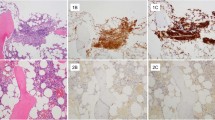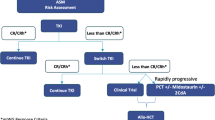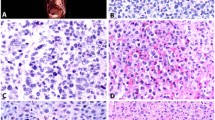Summary:
Mastocytosis is a rare disease characterized by an abnormal increase of mast cells in tissues. We report a case of acute myeloid leukemia (AML) with t(8;21) and mast cell leukemia (MCL) in which the mastocytosis persisted after standard chemotherapy and allogeneic stem cell transplantation, although the myeloid leukemia achieved molecular complete remission soon after induction chemotherapy. Donor-type mast cells were noted on d31 after transplant. No c-kit mutation was found before or after the transplant. This represents the first reported case in which rapid engraftment of mast cells of donor origin was documented. Thus, the possibility that the mast cell originates from a common myeloid precursor cell may be questioned and a reactive process should be considered in some cases of systemic mastocytosis.
This is a preview of subscription content, access via your institution
Access options
Subscribe to this journal
Receive 12 print issues and online access
$259.00 per year
only $21.58 per issue
Buy this article
- Purchase on Springer Link
- Instant access to full article PDF
Prices may be subject to local taxes which are calculated during checkout


Similar content being viewed by others
References
Valent P, Horny HP, Escribano L et al. Diagnostic criteria and classification of mastocytosis: a consensus proposal. Leuk Res 2001; 25: 603–625.
Kirshenbaum AS, Kessler SW, Goff JP et al. Demonstration of the origin of human mast cells from CD34+ bone marrow progenitor cells. J Immunol 1991; 146: 1410–1415.
Furitsu T, Tsujimura T, Tono T et al. Identification of mutations in the coding sequence of the proto-oncogene c-kit in a human mast cell leukemia cell line causing ligand-independent activation of c-kit product. J Clin Invest 1993; 92: 1736–1744.
Longley BJ, Tyrrell L, Lu S et al. Somatic c-kit activating mutation in urticaria pigmentosa and aggressive mastocytosis: establishment of clonality in a human mast cell neoplasm. Nat Genet 1996; 12: 312–314.
Nagata H, Worobec AS, Oh CK et al. Identification of a point mutation in the catalytic domain of the protooncogene c-kit in peripheral blood mononuclear cells of patients who have mastocytosis with an associated hematologic disorder. Proc Natl Acad Sci USA 1995; 92: 10560–10564.
Kitayama H, Kanakura Y, Furitsu T et al. Constitutively activating mutations of c-kit receptor tyrosine kinase confer factor-independent growth and tumorigenicity of factor-dependent hematopoietic cell lines. Blood 1995; 85: 790–798.
van Dongen HM, Macintyre EA, Gabert JA et al. Standardized RT-PCR analysis of fusion gene transcripts from chromosome aberrations in acute leukemia for detection of minimal residual disease. Leukemia 1999; 13: 1901–1928.
Fritsche-Polanz R, Jordan JH, Feix A et al. Mutation analysis of c-kit in patients with myelodysplastic syndromes without mastocytosis and cases of systemic mastocytosis. Br J Haematol 2001; 113: 357–364.
Fodinger M, Fritsch G, Winkler K et al. Origin of human mast cells: development from transplanted hematopoietic stem cells after allogeneic bone marrow transplantation. Blood 1994; 84: 2954–2959.
Valent P, Spanblochl E, Sperr W et al. Induction of differentiation of human mast cells from bone marrow and peripheral blood mononuclear cells by recombinant human stem cell factor /kit ligand in long term culture. Blood 1992; 80: 2237–2245.
Rottem M, Okada T, Goff JP et al. Mast cells cultured from the peripheral blood of normal donors and patients with mastocytosis originate form a CD34+/Fc epsilon RI-cell population. Blood 1994; 84: 2489–2496.
Galli SJ, Kitamura Y . Animal model of human disease. Genetically mast-cell-deficient W/Wv and Sl/Sld mice. Am J Pathol 1987; 127: 191–198.
Steingrimsson E, Moore KJ, Lamoreux ML et al. Molecular basis of mouse microphthalmia (mi) mutations helps explain their developmental and phenotypic consequences. Nat Genet 1994; 8: 256–263.
Ebi Y, Kanakura Y, Jippo-Kanemoto T et al. Low c-kit expression of cultured mast cells of mi/mi genotype may be involved in their defective responses to fibroblasts that express the ligand for c-kit. Blood 1992; 80: 1454–1462.
Ronnov-Jessen D, Lovgreen Nielsen P, Horn T . Persistence of systemic mastocytosis after allogeneic bone marrow transplantation in spite of complete remission of the associated myelodysplastic syndrome. Bone Marrow Transplant 1991; 8: 413–415.
Przepiorka D, Giralt S, Khouri I et al. Allogeneic marrow transplantation for myeloproliferative disorders other than chronic myelogenous leukemia: review of forty cases. Am J Hematol 1998; 57: 24–28.
Acknowledgements
We thank to Dr P Valent, Department of Internal Medicine I, University of Vienna, Austria for valuable assistance.
Author information
Authors and Affiliations
Rights and permissions
About this article
Cite this article
Chen, TY., Chen, JS., Huang, WT. et al. Rapid engraftment of mast cells of donor origin in a case of acute myeloid leukemia with mast cell leukemia after allogeneic stem cell transplantation. Bone Marrow Transplant 32, 111–114 (2003). https://doi.org/10.1038/sj.bmt.1704098
Received:
Accepted:
Published:
Issue Date:
DOI: https://doi.org/10.1038/sj.bmt.1704098



